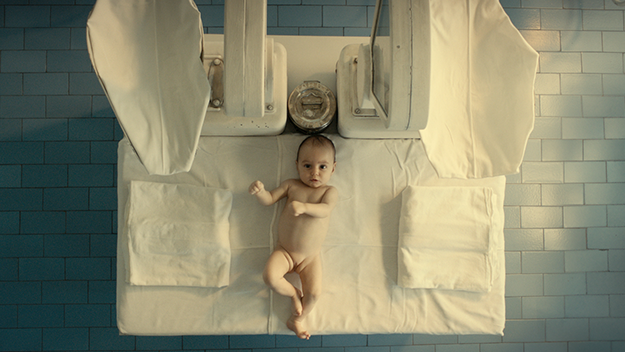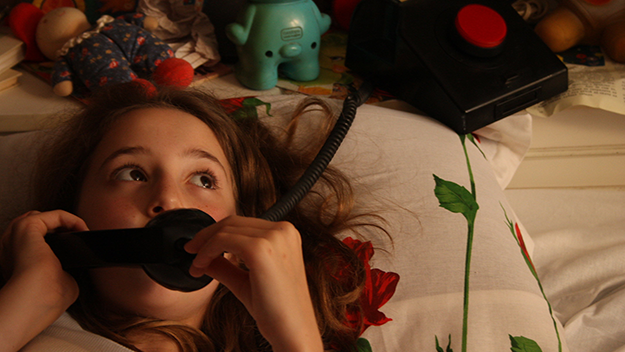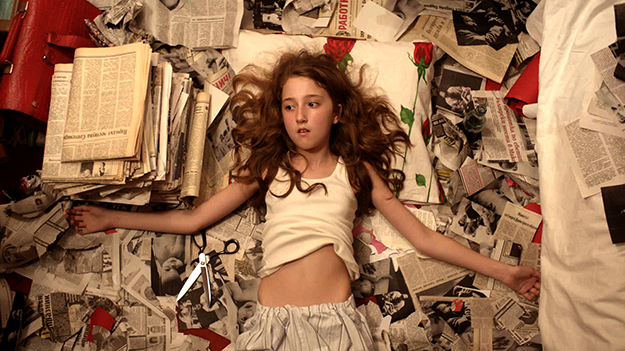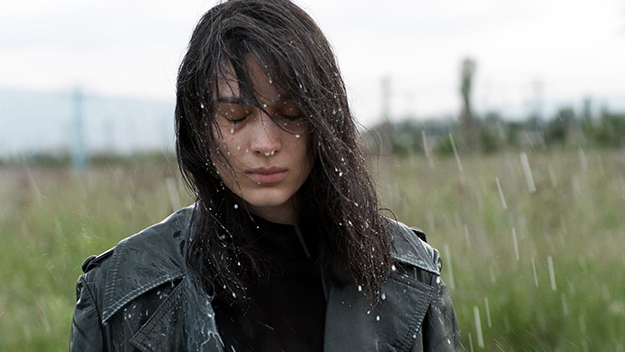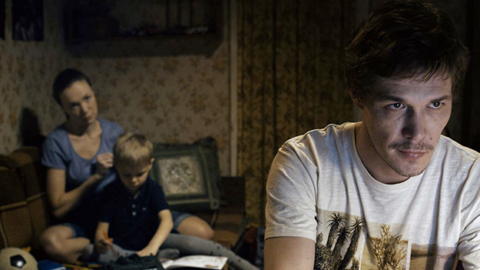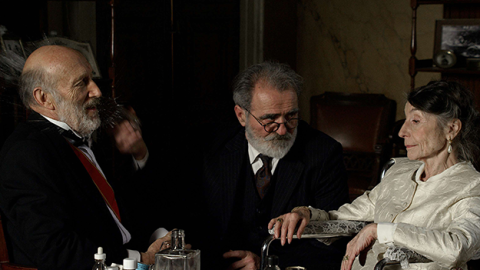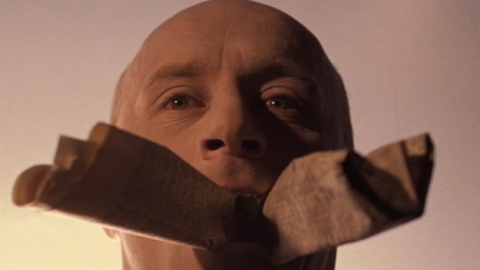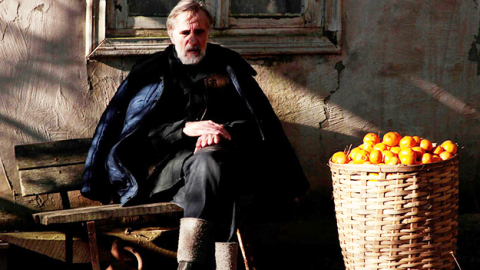Deep Focus: Viktoria
In this sentimental season for “democratic socialism,” Maya Vitkova’s Viktoria, a fable set in the final decade of the People’s Republic of Bulgaria (and a few years after), trenchantly evokes just how undemocratic socialism can be. The title character is born without a bellybutton right before the annual nationwide celebration marking “victory” for Bulgaria’s proletariat. Dubbed “Viktoria” to commemorate that Marxist triumph (and given an official birthday a day after her biological birth), she is declared “Baby of the Decade” and hailed as an evolutionary leap.
Imagine, a navel-free baby! Why wouldn’t her muss-free birth prove that, in the future, good socialist infants will be born without possessive bourgeois paraphernalia like umbilical cords? Officials theorize that hardy Bulgarian females, freed from the trauma of “cutting the cord,” will be able to expand the socialist population more impersonally and efficiently, presumably without leaving the work force for more than a day or two.
Viktoria lives with her biological mother, Boryana (Irmena Chichikova), and father, Ivan (Dimo Dimov). But her third parent is the party chief and head of state, Comrade Todor Zhivkov (Georgi Spasov), who gives Viktoria her own hot line—a sensible black desk phone with a pulsating red signal at the center of the dial. In one of the film’s many swift and flamboyant splashes of surrealism, the phone cord becomes Viktoria’s sole umbilical cord.
The ruling irony is that Viktoria, this New Socialist Child, is a mother’s nightmare. Boryana had resolved not to have a child until Ivan found a way to sneak the two of them out of Bulgaria. At the start of the film, she uses any suspicious gimmick or home remedy at hand to avoid pregnancy, from jumping rapidly after intercourse to watering her insides with a hand-pumped sprinkling system. It’s not all grotesque fun and games: in one eerie, indelible image, Boryana lies curled in the bathtub as her blood reddens the water. You presume she’s had a miscarriage, but three months later a female clinician inspects her and informs her that she’s 13 weeks pregnant.
When the film played the film-festival circuit, some reviewers lightly mocked Boryana for romanticizing glamorous advertisements in slick Western magazines. (She manages to peek at them while working at a library.) But what these glossy, sexy Madison Avenue images offer Boryana is not primarily erotic escape but a dreamscape of gracious living. A vision of a man or a woman living in a world of her own gracious choosing is fantasy enough for a wife who makes love to her husband just steps away from her forbidding mom Dima (Marianna Krumova). It’s telling that when the state provides Viktoria and her family with a spacious, anonymous socialist apartment, Boryana tacks a picture of the Statue of Liberty to a wall in the middle of it. For Boryana, puffing on cigarettes and swigging Coca-Colas (she hides and cools them in her toilet tank) are part of her private rebellion. Chichikova’s deep-seated moroseness in the role provides the film with its deepest source of comedy and tragedy. Vitkova energizes the film with audacious strokes, like Boryana’s fetus floating like a Red version of Stanley Kubrick’s Star Child as Boryana watches an up-with-the-People’s-Republic parade.
As long as the film plays off Boryana’s disdain for socialist Bulgaria’s kitsch—and her daughter’s blithe embodiment of that kitsch—Viktoria is loaded with double-barreled comedy-drama. Chichikova summons genuine pathos as she endures and ultimately embraces post-partum depression. The more the state lauds little Viktoria the more it justifies Boryana’s regret for her birth and hatred for everything she represents.
The director turns a bold fabulist’s eye to unexplored cinematic territory: Ivan carefully swabbing Boryana’s nipple to prepare her for breast-feeding; Boryana balking at bringing her child to her bosom, then, later, coming up dry as she desperately works a milk pump; and, finally, Boryana (or is it Viktoria?) hallucinating about milk exploding from the mother’s breast. (Vitkova would be the perfect filmmaker for Philip Roth’s The Breast.) There’s a wonderful hard-edged whimsicality to her shots of clinicians inspecting giggly little Viktoria’s navel-free body. Vitkova brings a sharp parodistic edge to trumped-up Bulgarian folk rituals and the state’s orchestrated generosity, like Viktoria’s family receiving a square-cut people’s sedan. Despite its frisky, inspirational color—red—it registers as the ultimate anti-sports car.
Vitkova’s nieces share the title character—Daria Vitkova plays her as a spunky 10-year-old and Kalina Vitkova plays her as a soulful teenager. The humorous stakes rise when Daria Viktova’s Viktoria becomes the mini-dictator of her grade school. Her insouciance is alternately irritating and winning. She cheerfully illustrates the idiocies that can take root in a proudly rational state convinced of its own bizarre logic. She’s never funnier than when she orders all her schoolmates to expose their midriffs (hence their navels) for inspection. During a state victory gala and 10th birthday celebration, Viktoria slams haphazardly on a piano and receives thunderous applause, though she follows a superbly disciplined children’s choir. What makes these scenes soar into the comic empyrean is Viktoria’s giddy self-satisfaction—her mastery of gestures that seem to say, “Ta-daah!” One of the film’s most daring running jokes concerns a lame little boy named Stefcho, who is born at nearly the same time as Viktoria, but with a malformed foot. To highlight the generosity of the state, Comrade Zhivkov gives Stefcho and his mother their own new apartment in the same faceless building. Stefcho even comes to like the way Viktoria calls him “a cripple.”
The movie goes from strength to strength as the People’s Republic begins to crumble. Viktoria cuts the phone-line/umbilical cord to Comrade Zhivkov. Boryana joins in anti-party demonstrations, but the country does not suddenly become a haven for free spirits; riots give way to candlelight processions for the Bulgarian Orthodox Church. As the adolescent Viktoria, Kalina Vitkova provides the film with a presence almost as mesmerizing as Chichikova’s. Touchingly, Viktoria’s now totally mute grandmother, Dima, whom Boryana once described as “not a mother, but a party member,” ultimately brings her granddaughter and daughter together, albeit after her death.
Sadly, the director loses her touch: her tone goes from seriocomic to serious to self-serious. In Viktoria’s first two-thirds, Vitkova’s exaggerated scaling satirizes the monumentalism of the People’s Republic of Bulgaria’s aesthetic. In the final third, her propensity to cut from intimate perspectives to a God’s-eye-view of the action comes off as a visual tic. She lingers so lovingly or mercilessly on close-ups, it’s a miracle her actors hold up under her gaze. Even the magnificent tableau of Boryana undressing and washing her mother’s dead body goes on too long.
Although the two movies’ subjects couldn’t be further apart, Viktoria’s flaws reminded me of those in Arthur Penn’s Little Big Man. The pivotal shifts in tone don’t build on the underlying comedy, but destroy it. In both cases, it’s simply an insurmountable challenge for the director to sustain a sophisticated yet folkloric tragicomedy for 150 minutes. But defects and all, navels or not, Viktoria remains a distinctive, trenchant social-political mock epic about a little big girl.
Michael Sragow is a contributing editor to FILM COMMENT and writes its Deep Focus column. He is a member of the National Society of Film Critics and the Los Angeles Film Critics Association. He also curates “The Moviegoer” at the Library of America website.



